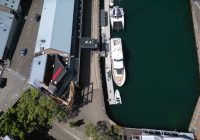Originally released in May this year, the NSW Government has reissued a warning about the dangers of Hydrogen Sulphide.
Hydrogen sulphide is a gas that is commonly generated within sewage holding tanks on board a vessel. It’s a toxic, flammable, and colourless gas that smells like rotten eggs.
If you breathe in high levels of hydrogen sulphide gas you can lose consciousness within one or two breaths, and lose your life within minutes.
They advise that “it is important to keep your vessel well maintained and properly ventilated to help prevent serious and dangerous issues”.
The fact sheet advises:
Hydrogen sulphide collects in confined spaces and poorly ventilated or enclosed areas that contain a sewage holding tank or other parts of sewage systems. If a system is damaged, malfunctioning or connections are not tight enough, and organic matter or sludges are disturbed, gas may escape. For example when adding or discharging effluent material into a compromised system.
Sewage holding tanks on vessels that also have galley waste directed to them are particularly prone to forming a greasy sludge film that floats to the surface of the tank, and this further promotes the production of hydrogen sulphide. Blockage of ventilation components also increases the risks of hydrogen sulphide back-venting, and escaping into toilet and other confined spaces via the sewerage pipe network.
Prolonged exposure to even low concentrations of hydrogen sulphide affects the sense of smell (olfactory desensitisation), so the ‘rotten egg’ odour can no longer be noticed. Higher concentrations will dull the sense of smell instantly, and often compromise a person’s ability to exit an affected area.
Exposure to lower concentrations (5 to 30 ppm) may cause eye irritation, headaches, and dizziness. Higher concentrations can cause blurred vision, neurological failure and death from respiratory failure. At extremely high concentration levels, death can be immediate.
To view the Fact Sheet click here









